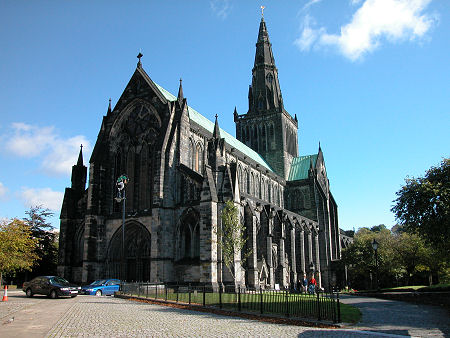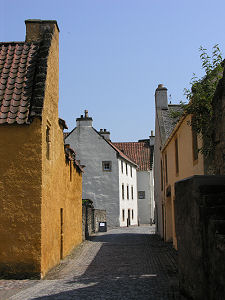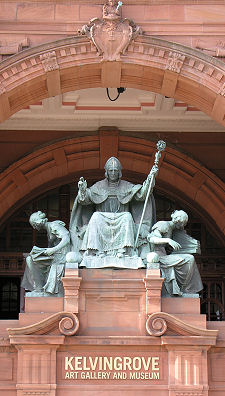 Glasgow Cathedral |
Saint Mungo, also known as Saint Kentigern, Cantigernus or Cyndeyrn Garthwys, lived from 528 to 13 January 614. He is the patron saint and founder of the City of Glasgow. The wider picture at the time is set out in our Historical Timeline.
According to the Life of Saint Mungo written by the monk, Jocelin of Furness, in about 1185, Mungo's mother was Princess Theneva (or Denw) daughter of Loth, the King of the Gododdin, who ruled an area centred on today's East Lothian. After an illicit encounter with her cousin, the young King Owain of North Rheged, now part of Galloway, Princess Theneva fell pregnant. Her unamused father had her tied to a chariot and launched off Traprain Law. It miraculously landed softly, hurting neither Theneva or her unborn child. The Gododdin, now believing Theneva also to be a witch, then cast her adrift in a coracle without oars on the River Forth. She drifted up-river and came ashore at Culross in Fife, where Kentigern was born.
Kentigern was given the name Mungo, meaning something like "dear one", by St Serf, who ran a monastery at Culross and took in both mother and son. St Serf then oversaw Mungo's upbringing. At the age of 25, Mungo began his missionary work on the banks of the River Clyde. Here he was welcomed by people previously converted to Christianity by St Ninian, and here Mungo built his church, close to the confluence of the River Clyde and the Molendinar Burn. Since the 1200s the site of this early church has formed part of Glasgow Cathedral.
Mungo worked on the banks of the River Clyde for 13 years until the anti-Christian King Morken of Strathclyde drove him out in about AD565. Mungo made his way through Cumbria to Wales, where he spent time with St David, possibly founded a cathedral at St Asaph, and even found time for a pilgrimage to Rome. But in the 570s King Rhydderch Hael of Strathclyde, having overthrown Morken, invited Mungo to become Archbishop of Strathclyde. Mungo initially based himself in northern Galloway. In August 584 Mungo is said to have converted the bard Merlin to Christianity near the site of a church he later founded: Stobo Kirk.
Mungo later returned to the River Clyde, where his church became the focus of a large community that became known as Clas-gu or "dear family". From these beginnings emerged the modern city of Glasgow.
It was at Clas-gu that Mungo was visited by Saint Columba, who at the time was working as a missionary in central Scotland. It was here, too, that Mungo died, apparently in his bath (or while giving a baptismal service: interpretations differ), on Sunday 13 January 614. He was buried close by his church, and today his tomb lies in the centre of the Lower Choir of Glasgow Cathedral, probably on the actual site of his grave.
In order to make someone a Saint, it was necessary to proved that the candidate had performed miracles during their lifetime. St Mungo was said to have preformed four, referred to in a poem:
Here is the bird
that never flew
Here is the tree that never grew
Here is the bell that
never rang
Here is the fish that never swam
In the first, he is said to have restored life to the pet robin of St Serf, which had been killed by some of his fellow classmates in Culross, hoping to blame him for its death. In the second he used branches of a tree to restart a fire at St Serf's monastery that had gone out because Mungo had fallen asleep while he was meant to be watching it. The third relates to a miraculous bell he brought back with him from Rome. And the fourth involved the story of Queen Languoreth of Strathclyde being accused of infidelity by her husband, King Riderich, who alleged she had given her wedding ring to her lover when, in reality, the king had himself thrown it into the river. Facing execution, the Queen appealed to St Mungo, who ordered a servant to catch a fish from the river. When the fish was cut open, the ring was found inside, demonstrating the Queen's innocence.
Today the bird, tree, bell and fish form the four elements of the crest of Glasgow City Council. St Mungo is also responsible for the motto of his city, based on his original prayer: "Lord let Glasgow flourish through the preaching of thy word and praising thy name." Since 1699 this has been shortened to "Let Glasgow flourish".


